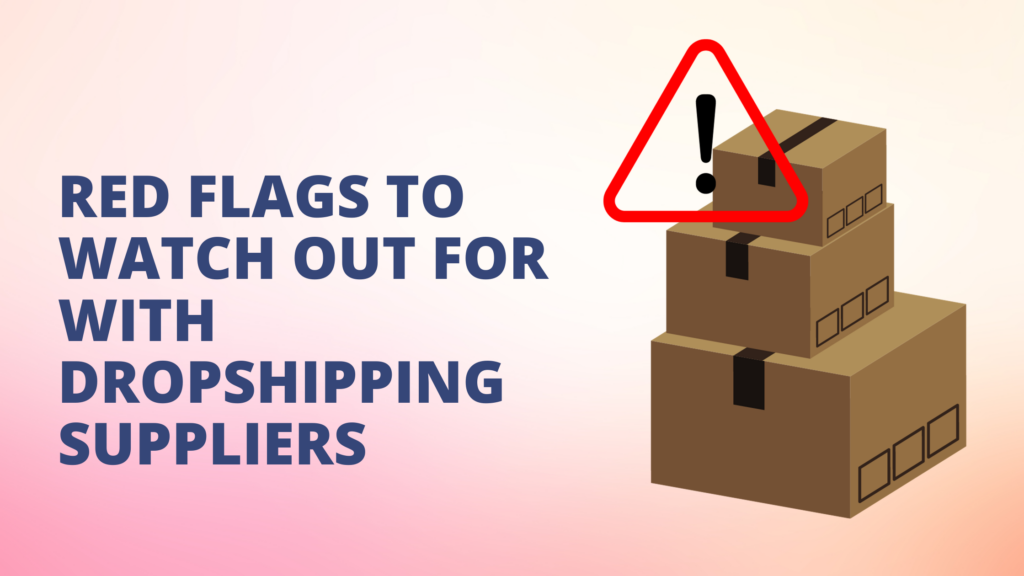Red Flags to Watch Out for with Dropshipping Suppliers
You’ve built a slick, easy to use online store, filled with products that get you pumped.
But wait – have you put real thought into who supplies these products?
In the dropshipping game, your suppliers are as key as the air you breathe. Not thoroughly checking them out can choke your business faster than you can say “refund please!”
Let’s dive in and explore why completely vetting suppliers is a must, and how you can bulk up your defenses against the supplier slip-ups lying in wait to trip you up.
The Perils of Inadequate Supplier Vetting
In the fast-paced world of dropshipping, meticulous attention to your supplier relationships isn’t just beneficial – it’s your lifeline.
When shortcuts are taken in supplier vetting, a chain of consequences inevitably unfolds, impacting your business in ways that can be as minor as a hiccup or as disastrous as an operation-halting snafu.
Unreliable suppliers are the Achilles’ heel of an e-commerce operation.
Imagine the frustration when a customer clicks the buy button, only to discover the promised two-day delivery morphs into a two-week waiting game.
It’s not just delivery dates that disappoint; poor-quality products sneak through, triggering an avalanche of returns and customer complaints.
Imagine a scenario where a hot-ticket item is flying off the virtual shelves and suddenly, you’re selling air.
Inventory inaccuracies lead to overselling, a critical problem that twines together embarrassment, customer distrust, and potential revenue losses.
Collectively, these missteps paint an image of your brand that’s far dimmer than the one you’ve meticulously crafted.
The reputation of a brand, once stained by a lack of professionalism, can take a lot of effort to clean up.
Understanding the Importance of Reliable Dropshipping Partners
Your success in dropshipping depends on the backbone of a solid partner – one that delivers your promises as efficiently and dependably as if they were their own.
Customer satisfaction is your currency, and fulfilling their expectations without fail is how you gain wealth in this business.
Efficiency is the heartbeat of fulfillment and shipping. Without it, orders wait in warehouses, and customers are left waiting tapping feet and progressively losing patience.
Reliability is the promise of accuracy in inventory counts and strong product quality – a promise that keeps customers returning.
Underpinning all of this is a sense of trust, a knowledge that what you promised your customer, your supplier can deliver.
Signs of a Communication Breakdown
Imagine sending an urgent message into the void and hearing nothing but echoes. Unreturned emails and calls about inventory levels and order statuses turn the task of management into guesswork.
When suppliers do reply, often you’re met with evasive answers devoid of the details necessary for your peace of mind. Add a language barrier into the mix, and resolving the simplest issues becomes a complex task.
Such communication breakdowns are the precursors to order processing delays and an unclear understanding of your stock levels.
Swift resolution of issues becomes unlikely, leaving you and your customers in limbo.
At Inventory Source, transparent communication isn’t just an ideal goal – it’s the bedrock of our operations.
The suppliers we align with are looked at not only for their product quality and reliability but equally for their willingness to engage in clear, candid, and timely dialogue.
Because for you to fulfill your customers’ needs consistently, the flow of information should be as steady and reliable as the products you sell.
Critical Red Flags When Assessing Dropshipping Suppliers
In your search for the perfect dropshipping partner, theres a minefield of potential red flags that could spell trouble for your business.
It’s not just about finding any supplier – it’s about finding the right one.
A supplier’s business details should be crystal clear.
This is the first checkpoint in knowing you’re dealing with a legit operation.
When crucial information is missing or as clear as mud, its an indication that the supplier might not be playing by the rules or isn’t serious about their own business.
1. Vague or Incomplete Business Information
When a supplier’s business information is sketchy, it’s a big, red stop sign.
It could mean they’re not a registered business or they just don’t have their act together.
Looking at their business registration info should be straightforward.
If not, why not?
Its a basic thing every legit business should have.
And what about their address?
If you can’t pinpoint where they are on a map, or worse, their address leads to an empty lot, it’s time to step back.
Inventory Source won’t even start a conversation with suppliers who can’t hand over their business registration documents and show us exactly where they’re located.
Its non-negotiable.
2. Resistance to Sharing Information or References
A supplier who clams up when asked for client references or sample products might as well be holding a sign that says, “Ive got something to hide.”
This kind of reluctance often suggests theyre not open for scrutiny.
What about their track record?
If they don’t want to share it, perhaps it’s not so great.
Inventory Source expects the opposite.
Suppliers must be open books, providing client references, samples for quality checks, and a history of their performance metrics.
3. Unrealistic Pricing and High-Pressure Sales Tactics
Pricing that seems too good to be true usually is.
If you’re feeling squeezed to sign a contract on the spot, chances are you’re not getting the whole story.
Low prices that suddenly jump up or contracts that are rushed through without the proper checks are tactics from the dark side of salesmanship.
Instead, Inventory Source insists on transparent, consistent pricing and takes the time to really get to know suppliers before forming a partnership.
We steer clear of any high-pressure sales games.
That’s just not how we roll.
4. No Physical Address or Contact Details
A supplier without a verifiable physical location or contact info is a ghost in the machine.
How can you trust them if you can’t even call or visit them?
It’s a huge risk because there’s no way to check if they’re for real. And if something goes wrong, good luck chasing down a ghost.
This is why Inventory Source makes it mandatory for suppliers to provide a physical address and solid contact options like a phone number and email.
It’s about ensuring strong, reliable communication and accountability.
After all, its your reputation on the line when you deal with suppliers.
You need to know they’ll back you up.
Building a Secure Dropshipping Foundation
Creating a steadfast dropshipping business is like constructing a skyscraper – it requires a strong foundation.
Without it, the first gust of wind might topple your hard work.
In the dropshipping market, that foundation is built on the rock-solid ground of inventory management.
If your inventory data is as unreliable as a house of cards, the slightest breeze – a surge in orders, an unexpected stock shortage – could bring everything down.
That’s why the bedrock of your business must be accurate and up-to-date inventory information.
It’s a crucial step in avoiding suppliers that could be more trouble than they’re worth.
The Role of Inventory Management in Avoiding Supplier Red Flags
Good inventory management is about knowing exactly what you have, where it is, and how much of it you can sell.
When inventory data isn’t accurate, you risk overselling, which is a fast track to unhappy customers and a tarnished reputation.
It links back to the importance of checking your suppliers’ reporting practices.
Can you trust their stock numbers?
Or will you have to apologize to customers when products they bought aren’t actually available?
That’s where Inventory Source steps in.
You get real-time insights into how much stock is available and where it’s stashed.
This clear visibility helps you avoid the pitfalls of unreliable suppliers and keeps you informed on inventory and fulfillment practices.
Leveraging Technology for Better Supplier Selection
Choosing the right suppliers shouldn’t be a game of eeny, meeny, miny, moe.
Advanced tools are now the magnifying glass you need to examine a supplier’s credentials closely, without the guesswork.
With these tools, you can identify higher-risk suppliers like a seasoned detective, focusing on who needs a closer look.
Inventory Source provides you with a technological toolkit fit for a dropshipping superhero.
The supplier risk dashboard puts control at your fingertips, giving you a bird’s-eye view of who’s who in the supplier world.
Our inventory API lets you check stock levels on the fly – real-time updates mean no more nasty surprises.
And let’s not forget the fulfillment analytics.
They’re like having night vision in the dark, showing you which suppliers can keep up with your pace and which ones are lagging behind.
With these tools in your arsenal, you’re not just hoping for the best – you’re making informed decisions that strengthen your dropshipping business.
Proactive Strategies to Mitigate Supplier Risks
In dropshipping, your suppliers are the gears that keep the clock of your business running.
But when one gear jams, the whole clock can stop.
Proactive strategies can keep your business running smoothly by spreading the risk and keeping tabs on quality.
Diversifying Suppliers to Enhance Resilience
Putting all your trust in one supplier is like walking a tightrope without a safety net. If that supplier hits a snag, you’re left balancing unsteadily with no support.
Diversifying your suppliers is your safety net. With multiple suppliers, a delay from one doesn’t mean a standstill for your business. You maintain inventory depth, ensuring that if one supplier runs out of stock, another can fill in the gap.
It’s not just about backup options, though; comparing suppliers is like running a race. You get to see who’s quick, who’s consistent, and who’s lagging.
This way, you can team up with the best and keep your business moving forward.
Inventory Source is like having the best coach for finding star suppliers.
We make it easy to connect with a variety of suppliers, so you’re never backed into a corner with just one option.
Ensuring Quality Control and Customer Satisfaction
Quality assurance isn’t just ticking boxes; it’s about safeguarding your customers’ trust.
Getting product samples ahead of time means you’re confident in what you’re selling.
Spot-checking shipments for defects avoids the fallout of customer complaints.
Listening to customer feedback is like having a direct line to their thoughts, shaping your business to meet their needs.
Inventory Source doesn’t just connect you with suppliers; we’re also your quality control watchdogs.
We request product samples from suppliers well in advance, so you know exactly what you’re getting. Random checks on shipments are part of our routine because no customer should ever be a quality control guinea pig.
Plus, we keep a close eye on customer satisfaction metrics. Happy customers are the goal, and we help you hit the mark every time.
Conclusion
To wrap it up, remember that successful dropshipping depends on thoroughly checking out your suppliers.
Don’t gamble on your store’s future. Suppliers who aren’t vetted can lead to failures – delayed shipments, poor quality, and inventory mistakes that hurt your brand’s trustworthiness.
Be proactive.
Dig into supplier backgrounds, demand openness, and look for clear communication.
Use technology to stay on top of inventory, and always have a backup plan by having multiple suppliers to make your business more resilient.
Stay alert.
Keep checking supplier performance, make quality control a priority, and listen to your customers.
Their satisfaction shows if you’re successful.
Now, take action.
Use the insights and tools from Inventory Source to examine potential suppliers closely, build a strong network, and manage your inventory like a pro.
It’s time to make your dropshipping business unshakeable, starting today.



